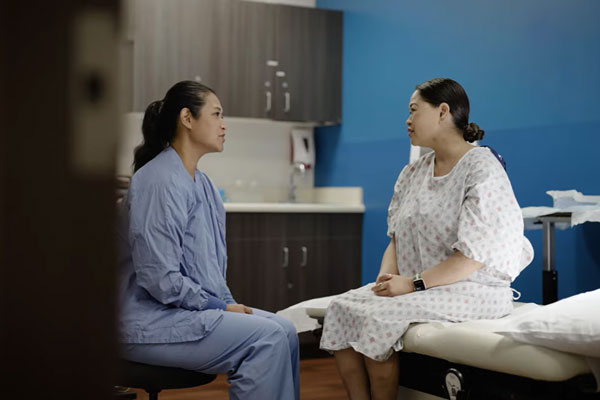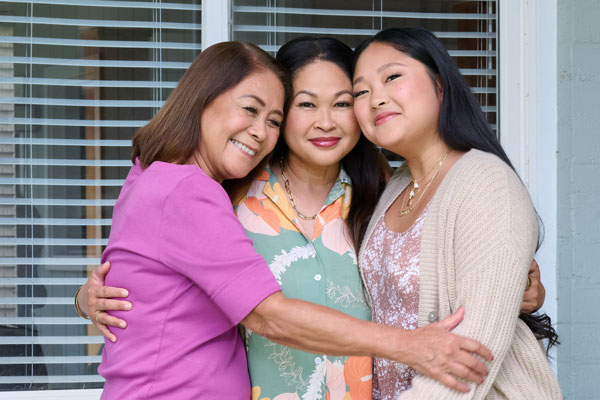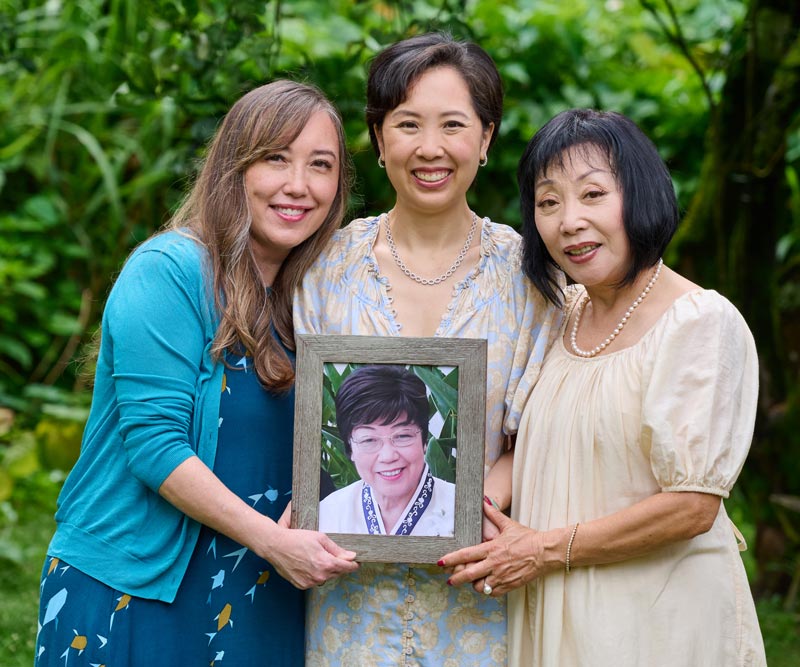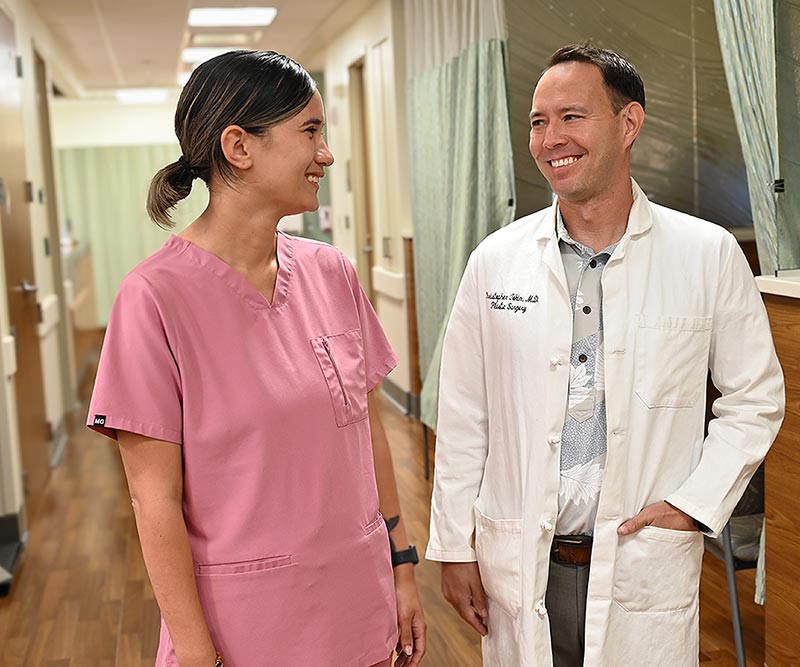
Strength, Support and the Unexpected: Lauren Agena's Journey Through Cancer Diagnosis
For Lauren Agena, a physician recruiter at Hawaii Pacific Health, life flowed in the gentle rhythms of normalcy. Her days were filled with travel for work, visits to her local barre studio and precious hours shared with family and friends.
"I wasn’t worrying about anything, really. I was just having a normal life, like any 40-year-old person," Lauren remembered.
The routines of career and parenthood, of laughter and community, painted a picture of fulfillment and stability.
But life, as Lauren would soon learn, can pivot in an instant.
An Ordinary Day, an Unexpected Discovery
It began with a lump – a subtle swelling on her neck that seemed not unusual at first. On the advice of her primary care provider, Lauren was referred to Dr. Maria Ver, a Hawaii Pacific Health Medical Group (HPHMG) surgeon at Pali Momi Medical Center, for its removal.
What might have been a routine outpatient visit became something far more consequential.
Lauren's comfort going into the appointment was bolstered by familiarity; she already knew Ver through work and trusted her implicitly.
"We were chitchatting, you know, just laughing and just talking about work," Lauren recalled. "She did an ultrasound on my neck, and she said that it just looks like an inflamed cyst. We'll remove it right here in the office."
The mood was light as the procedure began, with Lauren and Ver exchanging jokes.
Suddenly, the atmosphere shifted.
"Without her even saying anything, the energy in the room changed," Lauren said. "And then, she said, 'This doesn't look right.' And I knew, this is a little bit more serious."
The Moment Everything Changed: Hearing the Word "Cancer"
Ver, now somber, took a sample of the lump and sent her assistant to the pathology lab. A half-hour later, she returned with news that would turn Lauren's world upside down. The lump was cancerous.
"I completely lost it in her office," Lauren said. "I actually had my annual mammogram that very next week, so Dr. Ver called the Kapiolani Women's Center at Artesian and she changed my mammogram appointment."

The Uncertainty of Diagnosis
"I ordered head-to-toe imaging on Lauren, and the imaging did show that she had lesions, or lumps, on her left breast, as well as very large lymph nodes and also spots in her lungs," Ver said.
The emotional whiplash of going from a routine exam to an unknown cancer diagnosis left Lauren reeling.
She found herself suddenly thrust into a world of blood draws, imaging machines and a dizzying array of medical terminology. The normal worries of daily life evaporated, replaced by questions that seemed unanswerable:
Where had the cancer spread?
What would treatment look like?
Would her body and spirit be strong enough to withstand what was to come?
"I was so scared because I didn't know what type of cancer I had. All I knew was that I had cancer, and life just completely changed from that moment on," Lauren said.
Her next steps involved a breast biopsy to sample the three tumors in her breast, and then a lung biopsy with Dr. Eric Crawley, an HPHMG pulmonologist based at Pali Momi.
"What was really important was to confirm that this was actually breast cancer and not a second cancer," Crawley explained.
"Of course, my mind went to the worst-case scenario! I thought I had various cancers, and I was scared. Very, very scared. I didn't know how I would fight it," Lauren remembered.
The biopsy of her breast lumps revealed that she did, in fact, have breast cancer. The results from her lung biopsy showed those tumors were also breast cancer.
And the final pathology of that initial lump on her neck turned out to be breast cancer as well.
Lauren finally had her diagnosis – Stage 4 metastatic breast cancer.
What is Metastatic Breast Cancer?
Metastatic breast cancer is breast cancer that spreads beyond the breast and local lymph nodes to other parts of the body.
"When you hear you have Stage 4 … I can't explain that. I can't explain that feeling. Just fear. So much fear takes over," Lauren said. "I remember thinking, I don't want to die."
Metastatic breast cancer is a very life-altering diagnosis. However, it can be a chronic disease that is managed with medications over time.
Taking Back Control of Her Health: Learning to Live with Metastatic Breast Cancer
Lauren immediately started a medication plan to treat her cancer. Fortunately, her body has responded well to this first line of treatment so far.
Restaging scans show that the tumor has responded positively to treatment. In fact, her last PET scan showed something called NED – no evidence of disease.
"It just reaffirms that everything that I have been doing up until now works," Lauren said. "For me, that makes me go even 10 times harder."

"To look at her today, two years later, and recognize that they're not finding any signs of cancer in her body and that she's responding well to the treatment and she's not having a lot of side effects from it. Those are the things that are just really inspiring," Crawley said.
"I can't brag that I'm cancer free. I would love to, but that's not the case," Lauren said. "But it's really helped me to live in the present – really focusing again on the things that I can control."
One thing every woman can control, said Lauren, is scheduling her annual mammogram.
"I know going to get your mammogram can be very scary. It's not fun. But I encourage women to get their mammograms, because early detection is the best. Mammograms save lives," Lauren said.
Lessons Learned & Looking Ahead
Now, two years into her diagnosis, Lauren has learned how to navigate her new normal and shared tips for others who may be on a similar health journey.
Nurture Your Well-Being
"Your health is your priority. It's not being selfish. You need to take care of yourself in order to take care of others."
Before her diagnosis, Lauren was a certified barre instructor with a local studio. She had to hang up her sticky socks for a period following her initial treatment but has since returned to class as a student.
"It's my happy place. I completely love it – not just for the exercise, but for the community. They are an amazing group of human beings."
Lauren also stays active by going for walks around her neighborhood and playing golf.
"Being able to move my body is doing so much goodness for me, and it'll help me to be here for a very long time."

Build a Support System
"Having a strong community support is huge. I think that's so important to your healing in this journey."
Throughout her cancer journey, the human connections Lauren cherished proved invaluable. Her mother and daughter became her emotional anchors, offering support and comfort as she navigated the tumultuous days ahead.
"My mom has been my constant since I was a young child. She's always been my biggest supporter, my rock. I couldn't have asked for a better parent. And my daughter, she's, like, just the most genuine person. I'm so, so proud to be her mom."

She also found strength in having a coordinated care team at Hawaii Pacific Health.
"It's been very seamless between my oncologist, through my surgeon, through having mammograms. They all communicate with each other on the back end, which is great because I don't have to repeat the story. When you're going through something traumatic like this, having to repeat it over and over again can really dampen your mood. I couldn't imagine going to different providers and they're all over the place and none of them talk to each other. I can't imagine that being conducive to healing."
Have a Positive Mindset
"Cancer already took up so much space in my mind and in my heart that I didn't want to give it any more power than it already had."
Instead of dwelling on the negatives that come with having cancer, Lauren chose to focus on ways to show up for herself every day.
"I told myself, Lauren, you were diagnosed with stage 4 metastatic breast cancer. You can't control that, but what can you control?"
Hear more from Lauren, her doctors and Lauren's family members in the video below.
Published on: October 6, 2025




